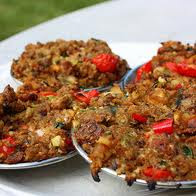Clams
Handful of Quahogs
Hard clams are edible marine bivalve mollusks native to the eastern shores of North America from Prince William Sound to the Yucatan Penninsula. One of the best known of these hard clams is the Quahog clam, shown in the picture above. This clam, also referred to as the round clam, is a favorite on the East coast. Many recommend it be eaten raw or in chowder, but many other recipes exist for this popular clam (see the picture below).
Stuffed, Baked Quahogs
Quahogs are hermaphrodites, so they are born as males and change to and remain females as they mature. Smaller versions of the Quahog clam include Littlenecks and Cherrystones (discussed next). Confusingly, the name "Quahog" also refers to an ocean clam species (Artica islandica) that is of different family of bihalves.
Ocean Quahog
Cherrystones, as mentioned earlier, are smaller versions of the Quahog clam. Cherrystones can grow up to 3 inches wide and are named after the Cherrystone Creek in Virginia. These clams are also typically eaten raw. In fact they are usually the clams you will get when you order clams on the half-shell.
Cherrystones
One of my personal favorite clams is the geoduck (pronounced "gooey-duck") clam! This is a very odd looking clam that has even been featured on shows such as "Andrew Zimmerman's Bizzare Foods" and "Dirty Jobs with Mike Rowe." This clam is related to the giant clam, can have a shell 5-8 inches wide, and can weigh in at over 5 pounds. (Some varieties in the deep ocean have been reported to grow over 100 pounds!!!) The most unique feature of the geoduck -- it's LONG neck, or siphon. This neck can easily grow to be +3 feet in length. The geoduck lives deep in the sand and is thus harvested by digging down, sometimes as far as 70 feet deep. Different parts of the clam are used for different recipes such as chowder and even steaks (clam steaks, that is).
Harvested Geoducks at Market
Diving for Geoducks!!!
Yay for Geoducks!

















